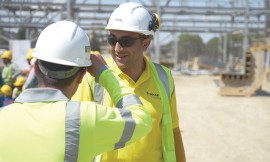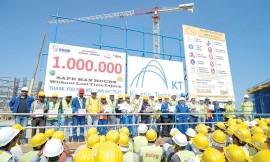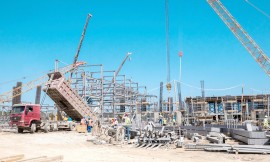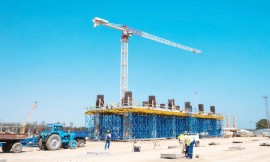
SOCAR Polymer: products to meet international standards
SOCAR Polymer featured in the Caspian Energy Journal
October 2016 N2 (98)
Azerbaijan continues to consistently implement energy policy aimed at large-scale development of the national fuel and energy complex, in particular, petrochemical and gas chemical industries.
The stake has been placed on more advanced and integrated processing of oil and natural gas including the increase in theshare of derivative productsin export. Owing to this, the country will not only substantially expand its share in the market of primary energy resources, such as natural gas and crude oil, but also obtain a rightful position at the more profi table market of high-cost petrochemical and gas chemical products. The largest projects designed to turn these intentions into reality will be SOCAR Polymer’s projects including a new SOCAR GPC project.
The major goal of the SOCAR Polymer project is to monetize associated gasesextracted in the course of oil refining operations, and set a basis for medium and small enterprises engaged in processing of plastics.
Let’s make comparison with the Turkish market. Nowadays, Turkey is consuming about 6.8 mln tons of plastics. 250,000 people are employed in the industry. 37.5 people are employed in production of each 1000 tons of products if converted to end product. That is to say, by processing the plastics into end product in Azerbaijan we are creating a very solid basis for the increase in quantity of working places in the country, which also implies an import substitution. Consumption of plastics in the world is growing faster than consumption of oil. Consumption of liquid hydrocarbons grew by 40-45% over the last 25 years, and the consumption of plastics by 200% over the same period. In recent years, growth in plastics consumption has been consistently higher than the global GDP growth, whereas growth in the consumption of liquid hydrocarbons by at least 2-2.5 times lower. This trend will continue, which means that we are moving with our oilgas feedstock reserves from a slowly growing segment to a fast-developing one.
Construction of plants by SOCAR Polymer is carried out strictly on schedule. According to the contract, the planned polypropylene and polyethylene plants will be delivered on a turn-key basis in the fi rst quarter of 2018 and the third quarter of the same year respectively. Production capacity of a propylene plant is 180,000 tons per year, and the polyethylene plant will produce 120,000 tons per year respectively. Aggregate capacity of the plants will make 300,000 tons per year. 500 workers will be employed by the plants on a permanent basis. Up to 1.52 thousand workers will be engaged at a construction site. Key labor resources will be composed of Azerbaijani citizens, although, we have contractors of foreign origin too; the plants will be constructed on turn-key basis.
A “turn-key” construction contract means that a construction company undertakes to fully execute a construction job (including commissioning stage) in accordance with the preagreed criteria within the budget and time fi xed in such contract.
There is a chain of companies known as licensors and patentees of technologies. LyondellBasell and Ineos companies are our licensors for propylene and polyethylene products respectively. And it means that our products will meet the highest standards.
Polyethylene which we intend to produce can be used for production of any articles right up to manufacturing of pipes designed for highly pressurized gas, water supply or sewages. Propylene is a so called eco-friendly plastic which is widely used in production of food packaging and in the medical industry.
Both of these modern plants will implement the most advanced technologies in Azerbaijan thus meeting the highest environmental standards. About 30-40% of the products will be supplied to the domestic market. It will fully meet the needs of the domestic market. The rest of the products will be exported. Turkey and Eastern Europe are the main markets for exports. After the launch of the Baku-Tbilisi-Kars railway associated logistics costs will be substantially reduced.
A notable fact is that a project-tied lending principle has been used in Azerbaijan for the fi rst time under this project. Funding includes 40% of owned capital and 60% of a credit granted by Gazprombank. The pledge for the credit is the project itself, but not the guarantees provided by the State or by SOCAR. The use of a turnkey construction contract, solid guarantees on the supply of raw materials, and insurance package became three components, which suffi ced to get the 10-year loan in the amount of 489mln US$from the bank. Meanwhile, the investment cost of the project is estimated at 750mln US$. Annual currency proceeds of the project will be about 600mln US$.
The plan is to monetize the entire volume of chemical feedstock available in Azerbaijan. This is a growing segment of the oil industry, which is the basis for the development of small and medium businesses. This project initiated by SOCAR Polymer is one of the chains that were built by the Company. It is planned to build a gas processing plant of SOCAR for the GPC in the future, as well as to develop a gas-chemical chain in Azerbaijan as a whole and in the chemical industry in particular.



